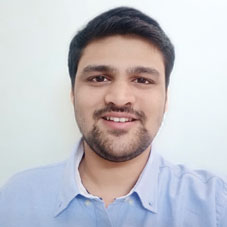
Ojas Barve
Chief Learning Officer
His role soon evolved from being a teacher to an educationist and he began to dig deeper into the fields of curriculum design and pedagogy. In 2016, he founded the Excel Institute of Languages thereby entering into a relatively unexplored niche in the education sector where he trained students in Global Languages. Currently, he leads the Ampersand Edtech's foray into blended learning and government projects. For his exceptional contribution to the Edtech companies, Ojas has been featured on ANI News as a Brilliant Young Achiever Making India Proud and also had been felicitated with the Ace Award in the Individual Category at LIDO. Let’s hear it from Ojas.
What are the most important aspects that you consider while building zero-to-one products for Edtech companies?
When we make a new product, it is made for the people but when we sell the same to an external customer, our internal customers must be aligned too. Hence, I believe the most important aspect is getting the right team for the right product. I do not need a 100 percent
skilled team for the right product. I do not need a 100 percent skilled team to work but a team that is willing to give their 100 percent to make things work.
What are the strategies or frameworks that you have designed for Edtech companies to ensure deeper learning?
Whenever we design a curriculum framework that is based on pedagogy, I believe it is important to understand the final result or the outcome first. The destination should be clear in my mind so that the route can be defined. For example, I need to understand which subject a student is going to learn and across each subject what is the final result I am expecting the student to have. I keep in my mind that my final destination is a child being able to have the conceptual clarity of a subject.

What are your comments on schools adopting newer teaching methods postCOVID? Also, what are your thoughts on how schools will learn 10 years from now?
COVID has taught us very new things; we never knew that working from home will be a good option for most companies but we tried doing it and we were successful. Similarly, schools have also tried running their classes online. But I believe that school life cannot be separated from a student’s overall life. However, things can be put into a combination of both online and offline. So, in the future, schools will be in a position to adopt a blended learning approach and at the same time, they will also realize that assessments can be done in a much more innovative, easy, and technology-enabled environment.
As an educationist, which sustainable development goals do you think today's tech companies should focus on?
The UN has given us 17 SDGs that are focused on developing society. Among those 17 goals, today’s
Every mind who wishes to learn should be allowed to learn
What are the strategies or frameworks that you have designed for Edtech companies to ensure deeper learning?
Whenever we design a curriculum framework that is based on pedagogy, I believe it is important to understand the final result or the outcome first. The destination should be clear in my mind so that the route can be defined. For example, I need to understand which subject a student is going to learn and across each subject what is the final result I am expecting the student to have. I keep in my mind that my final destination is a child being able to have the conceptual clarity of a subject.

What are your comments on schools adopting newer teaching methods postCOVID? Also, what are your thoughts on how schools will learn 10 years from now?
COVID has taught us very new things; we never knew that working from home will be a good option for most companies but we tried doing it and we were successful. Similarly, schools have also tried running their classes online. But I believe that school life cannot be separated from a student’s overall life. However, things can be put into a combination of both online and offline. So, in the future, schools will be in a position to adopt a blended learning approach and at the same time, they will also realize that assessments can be done in a much more innovative, easy, and technology-enabled environment.
As an educationist, which sustainable development goals do you think today's tech companies should focus on?
The UN has given us 17 SDGs that are focused on developing society. Among those 17 goals, today’s
Edtech companies should focus on these top five goals. The first goal is ‘No Poverty’ Education enables people to do better in their lives by making them independent. Hence, it should be the first focus of Edtech companies. The second goal is ‘Quality Education’ Edtech companies should make sure that under any circumstance learning should not be compromised. The third goal is ‘Decent Work and Economic Growth' this is a very important SDG because while we are working for our livelihood some other organization somewhere is benefiting from our services.
And because that organization is benefiting, the ecosystem is developing. Economic growth is only possible when everybody starts working and becoming independent in their lives. ‘Industry Innovation and Infrastructure' is the fourth goal. We are witnessing a rapid growth of infrastructure and businesses/ startups in India this has again only been possible through education. Lastly, the fifth goal is, 'Reducing Inequalities’; a child born in a metro city and a child born in a rural village should have the access to the same (quality) education system. Every child or learner who wishes to learn should be allowed to learn.
What advice would you give to budding leaders in the education sector?
Firstly, it is very important to invest in people and teams. Secondly, leaders should stay committed to their vision. Thirdly, they must have strong foresight,and the fourth is being open to feedback. Leaders should also respect the ideas of their team but at the same time, not sugar coat their poor performances. I also believe in the mantra of following the key Ps of leadership i.e. pay for performance, promote for potential, and penalize for pratfall. That is the formula that I have internalized in my professional life and would advise budding leaders to do the same.
Ojas Barve, Chief Learning Officer, Ampersand Edtech
Ojas is a postgraduate in Human Resources from the Welingkar Institute of Management, and a Bachelor in Management from the University of Mumbai. He is currently Chief Learning Officer at Ampersand Edtech and is leading blended learning and government projects.
And because that organization is benefiting, the ecosystem is developing. Economic growth is only possible when everybody starts working and becoming independent in their lives. ‘Industry Innovation and Infrastructure' is the fourth goal. We are witnessing a rapid growth of infrastructure and businesses/ startups in India this has again only been possible through education. Lastly, the fifth goal is, 'Reducing Inequalities’; a child born in a metro city and a child born in a rural village should have the access to the same (quality) education system. Every child or learner who wishes to learn should be allowed to learn.
What advice would you give to budding leaders in the education sector?
Firstly, it is very important to invest in people and teams. Secondly, leaders should stay committed to their vision. Thirdly, they must have strong foresight,and the fourth is being open to feedback. Leaders should also respect the ideas of their team but at the same time, not sugar coat their poor performances. I also believe in the mantra of following the key Ps of leadership i.e. pay for performance, promote for potential, and penalize for pratfall. That is the formula that I have internalized in my professional life and would advise budding leaders to do the same.
Ojas Barve, Chief Learning Officer, Ampersand Edtech
Ojas is a postgraduate in Human Resources from the Welingkar Institute of Management, and a Bachelor in Management from the University of Mumbai. He is currently Chief Learning Officer at Ampersand Edtech and is leading blended learning and government projects.

